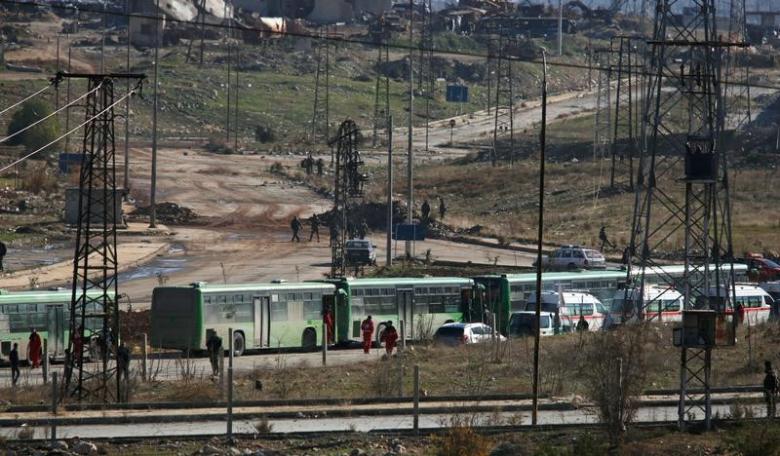Aleppo rebel evacuation under way after ceasefire deal
ALEPPO, SYRIA/BEIRUT: An operation to evacuate thousands of civilians and fighters from the last rebel bastion in Aleppo began on Thursday, part of a ceasefire deal that would end years of fighting for the city and mark a major victory for Syrian President Bashar al-Assad.
A convoy of ambulances and buses with nearly 1,000 people aboard drove out of the devastated rebel-held area of Aleppo, which was besieged and bombarded for months by Syrian government forces, a Reuters reporter on the scene said.
A Syrian official source told Reuters that a second convoy was likely to bring people out on Thursday.
Women cried out in celebration as the buses passed through a government-held area, and some waved the Syrian flag.
An elderly woman, who had gathered with others in a government area to watch the convoy set off, raised her hands to the sky, saying: "God save us from this crisis, and from the (militants). They brought us only destruction."
Wissam Zarqa, an English teacher in the rebel zone, said most people were happy to be leaving safely. But he said: "Some of them are angry they are leaving their city. I saw some of them crying. This is almost my feeling in a way."
Earlier, ambulances trying to evacuate people came under fire from fighters loyal to the Syrian government, who injured three people, a rescue service spokesman said.
"Thousands of people are in need of evacuation, but the first and most urgent thing is wounded, sick and children, including orphans," said Jan Egeland, the U.N. humanitarian adviser for Syria.
Columns of black smoke could be seen rising from the rebel-held area, where residents hoping to depart were burning personal belongings they do not want to leave for government forces to loot.
RUSSIAN DRONES
A senior Russian general, Viktor Poznikhir, said the Syrian army had almost finished its operations in Aleppo. Since August, around 3,000 rebels had left and 108,000 civilians had been moved to safe parts of the city, he said.
Rebels and their families would be taken towards Idlib, a city in northwestern Syria which is outside government control, the Russian defence ministry said.
Idlib province, mostly controlled by hardline Islamist groups, is not a popular destination for fighters and civilians from east Aleppo, where nationalist rebel groups predominated.
A senior European diplomat said last week that the fighters had a choice between surviving for a few weeks in Idlib or dying now in Aleppo. "For the Russians it's simple. Place them all in Idlib and then they have all their rotten eggs in one basket."
Idlib is already a target for Syrian and Russian air strikes but it is unclear if the government will push for a ground assault or simply seek to contain rebels there for now.
The International Rescue Committee said: "Escaping Aleppo doesn't mean escaping the war.
"After witnessing the ferocity of attacks on civilians in Aleppo, we are very concerned that the sieges and barrel bombs will follow the thousands who arrive in Idlib."
The evacuation deal was expected to include the safe passage of wounded from the Shi'ite villages of Foua and Kefraya near Idlib that are besieged by rebels. A convoy set off to evacuate the villages on Thursday, Syrian state media said.
Efforts to evacuate eastern Aleppo began earlier in the week with a truce brokered by Russia, Assad's most powerful ally, and Turkey, which has backed the opposition. That agreement broke down following renewed fighting on Wednesday and the evacuation did not take place then as planned.
A rebel official said a new truce came into effect early on Thursday. Shortly before the new deal was announced, clashes raged in Aleppo.
Government forces made a new advance in Sukkari - one of a handful of districts still held by rebels - and brought half of the neighbourhood under their control, according to the Syrian Observatory for Human Rights, a monitoring group.
The Russian defence ministry said - before the report of the government forces' advance in Sukkari - that the rebels controlled an enclave of only 2.5 square km (1 square mile).
RAPID ADVANCES
The evacuation plan was the culmination of two weeks of rapid advances by the Syrian army and its allies that drove insurgents back into an ever-smaller pocket of the city under intense air strikes and artillery fire.
By taking control of Aleppo, Assad has proved the power of his military coalition, aided by Russia's air force and an array of Shi'ite militias from across the region.
Rebels have been backed by the United States, Turkey and Gulf monarchies, but that support has fallen far short of the direct military assistance given to Assad by Russia and Iran.
Russia's decision to deploy its air force to Syria more than a year ago turned the war in Assad's favour after rebel advances across western Syria. In addition to Aleppo, he has won back insurgent strongholds near Damascus this year.
The government and its allies have focused the bulk of their firepower on fighting rebels in western Syria rather than Islamic State, which this week managed to take back the ancient city of Palmyra, once again illustrating the challenge Assad faces reestablishing control over all Syria.






